- Home
- Brandon Sanderson
Infinity Blade: Redemption
Infinity Blade: Redemption Read online
Salt Lake City, Utah
PROLOGUE
“YOU WANT stories of Siris, do you? Stories of the Deathless who fought for ordinary men?”
“Yes.”
“Stories of the youth reborn a thousand times, raised in each incarnation to try—and fail—to slay the God King? Stories of the man who did not know he was immortal?”
“Yes.”
“Stories of Siris abandoned? Locked in the Vault of Tears, betrayed by the Worker of Secrets? Left to rot by the one who should have been his ally? These are the stories you seek?”
“They are.”
“Well, good. Because stories . . . stories I have. Too many stories. Stories like rats in the wheat, fat and glutted upon my thoughts and memories. It’s well past time that someone heard them . . .”
CHAPTER
ONE
SIRIS SNAPPED open his eyes and rolled. He had only a few moments before—
Hands grabbed his hair, yanking his head upward. A knee against his back forced him down to the cold stone.
Vision blurry, Siris twisted, trying to claw at the hands holding him. He had to—
The hands smashed Siris’s face down into the stone ground.
All went black.
CONSCIOUSNESS returned to Siris like an eagle spreading its wings. His mind flooded with sensation. The cold ground. His face resting in a pool of nearly dried blood, sticky against his skin. The stale scent of the prison.
He took a deep breath and threw himself to his feet, turning to swing. He opened his eyes to a blurry world of shadows and filtered light.
Those shadows caught him, tripped him, then slammed him back against the ground.
Siris growled. His primal instincts knew where his enemy would be, and he kicked upward into a soft stomach. Connecting felt so satisfying.
The shadows cursed. Siris pulled his foot back and rolled to his feet.
A weight slammed him backward against the wall. Siris writhed, but hands grabbed his head and jerked it to the side.
Snap.
All went black.
SIRIS WAITED for his body to restore itself.
First, his soul tried to flee, to escape to a rebirthing chamber. That was far better than returning to a body that had been defeated—a fallen body was a compromised body. Innate Deathless programming tried to send his soul, his Q.I.P., to safety.
Siris registered this as a vague sensation, tangible only in the most fleeting of ways. Like the memory of a taste. A sense of uncontrolled soaring, a panicked flight.
Then a wall, like invisible glass. His soul was rebuffed as it had been each time before. It could not break out of the prison, and was instead forced back. Back into the imperfect body, the trapped body.
That body belonged to an immortal. It would restore itself, given time.
Eventually, consciousness swelled in his mind, and he regained control. He tried to feign death. His thinking was fuzzy, his eyes not fully restored, he needed to—
“You think I don’t notice you, Ausar?” a voice said from nearby. Siris felt warm breath on his neck. “You think I can’t hear you stir as you struggle back to life?”
Siris snapped his eyes open and reached for the figure above him, his ancient enemy. He could see only a blur.
“I put your eyes out each time I kill you,” the God King growled, grabbing Siris’s head and smashing it down against the floor.
Pain.
“Your body heals essential organs first,” the God King continued. “Your eyes come late in the process.”
Siris screamed, flailing.
The God King smashed his head against the floor again.
All went black.
DEVIATION
THE FIRST
RAIN BLEW against the window of Uriel’s cubicle.
A window. He had worked hard for a window. Mary had pushed him to reach for that achievement. When you worked every day with numbers and abstractions, she said, it was good to be able to look out and see the world as it was—not as simply figures on a page, to be added and assessed.
There are numbers out there too, though, Uriel thought, looking out the window. Natural laws commanded the rain. Unseen statistics and figures determined where each drop would fall, how hard each would hit, the precise route each would take sliding down the glass. It was well beyond the abilities of mankind to calculate those figures, but that didn’t mean they didn’t exist.
“So,” Adram said nearby, “I told her that she’d better turn down the oven, because it was about to get a lot hotter inside!”
The regular team of coffee-mug-holding, suspender-and-tie-wearing marketing fellows laughed at Adram’s joke. At least Uriel assumed it was a joke. He didn’t understand why it was funny. Too many jokes didn’t make sense when you broke them apart, not logically. The numbers didn’t add up to laughter. Not for him.
He turned back to his smartdesk, lifting his stylus and making a few notations on a screen already full of numbers and ledgers.
Nearby, Adram leaned with one arm on the wall of the cubicle nearest him. He continued to chat as people passed. Some joined his group while others moved off. But Adram kept talking. Always talking. The man never seemed to get anything productive done.
Normally, Uriel could ignore him, but today it was tougher. The numbers . . . the numbers were so worrisome. Uriel needed quiet, not this constant blathering. Who had thought it a good idea to put an actuary next to the marketing department?
Uriel raised his hand to his forehead, kneading it as he tapped his smartdesk screen, bringing up percentages. If this happens . . . He brought up another list of percentages. Not if. When. It will happen.
Each calculation spelled out disaster.
Unfortunately, that wasn’t what people wanted to hear from him. They got angry when he told the truth—as if it were his fault. As if he could make the numbers do anything.
He wished so much that he could.
Perhaps I can sugarcoat this, he thought. I could present the more optimistic side. Like they’re always telling me to.
He glanced at the picture on the top of his desk. Jori, wearing a baseball cap. No. No, Uriel would not sugarcoat what could happen if this technology were released. He would have to tell the truth. For his son’s sake.
That would make him unpopular, but why did they order a risk-assessment analysis if they didn’t want to hear the findings? Executives were so odd. All except for Mr. Galath, chairman of the board. He always seemed to listen. He was one of the only people who made Uriel think this company had anything of a future.
Adram’s chatter finally died down. Uriel glanced over. It looked like people had passed on to do actual work for once, leaving Adram alone. The tall, overly smiling man glanced at Uriel.
Please, no.
Adram sauntered over to Uriel’s cubicle. “Ho there, Spunky!” The man placed a hand on Uriel’s shoulder. “You’ll have good news for us at the meeting, right?”
“I will have facts, Adram,” Uriel said, prying the man’s fingers from his shoulder. “Nothing more or less.”
“Sure, sure.” Adram took a sip of coffee, then gestured toward the desktop and its display of neat ledgers. “You can really make sense of all that?”
“This is my domain,” Uriel said. “I can make the numbers speak—assuming I care for them, encourage them. Control them.”
“You make it sound like you’re a king, Uriel.” Adram laughed. “King of the ledgers.” He leaned down. “You’ll make them speak good things about Project Omega, right?”
“The numbers do not lie. I will say what they tell me.”
“They don’t lie. Cute. Look, Uriel. If you are so good with numbers, why do you always see the o
pposite of what everyone else knows?”
“Everyone else is wrong.” Wasn’t that obvious?
Adram sighed. “You realize that this is why nobody likes you, Uriel.”
“That statement is patently false. My wife and son both like me.”
“I wasn’t trying to pick an argument,” Adram said. “I was trying to help you out. As a bud.”
“A . . . bud.”
“Sure.”
“You.”
Adram sighed again, standing up straight. “Project Omega is going to happen, and it’s going to make us all very rich. You count those beans, Uriel. Count them well. And take a piece of advice—for once? Make them say that Project Omega is ready to go live.”
Adram patted Uriel’s shoulder, as if with affection, then he ambled away, raising a hand toward Jane and calling out something flirtatious.
CHAPTER
TWO
I WOULDN’T be here if I hadn’t grown weak, a part of Siris thought.
The Dark Thoughts were stronger now. Siris recognized them as part of himself, and had admitted—to his shame—what he had been. A warlord. A despot. A murderer.
He didn’t remember that person. Whatever had been done to him . . . it had wiped away those memories, permanently. He felt blessed for that, was thankful for it.
The process, however, was incomplete. Those terrible memories had been taken, but that left him with something more primal. Instincts. The brutality of a creature who had lived as a tyrant for eons.
I could have dominated, ruled. I had the Blade. I could have left the Worker alone, could have slain Raidriar. Now . . . now all that is left to me is vengeance.
Siris threw himself to his feet, eyes squeezed shut. For a moment, he let the Dark Thoughts—the shadow of his ancient self—control him.
He caught the God King’s arm as it reached for him. Eyes still shut, Siris spun around, twisting the arm in its socket and popping the joint at the shoulder. Raidriar screamed. Siris felt the man writhing, cursing, spinning into another attack. Siris stepped away, but a shade too slow. The God King’s leg sweep sent him tumbling.
He kicked as he fell, striking where he knew—somehow—the God King would be standing. Siris’s foot connected with something hard—the God King’s knee.
A snap, accompanied by another scream.
Siris moved. No thought. No planning. He scrambled forward, eyes still firmly shut. He couldn’t trust them. Trying to rely on them only got him killed. Over and over.
His hands found an arm. The God King reached a clawlike hand to Siris’s face, ripping at the skin.
Siris ignored the pain, methodically grabbing his enemy by the head and pounding his skull against the floor.
Smash.
Smash.
Smash.
Like a primeval man breaking open a fruit with a tough rind.
Time passed. Siris eventually became aware of himself in the prison, kneeling over the God King’s bloodied corpse. Raidriar, the God King, did not breathe. Siris’s own breathing went in and out with ragged gasps.
His eyes finally worked, but he didn’t see much. An open cell of rough-hewn rock—the soul prison in which the Worker of Secrets had been held.
Much of the floor was coated with dried blood. His, and that of the God King.
This is what I can do, he thought. When I let my Dark Self free.
He forced down those instincts. It was a struggle, one nearly as difficult as killing the God King had been. Eventually, Siris reached forward and pressed his thumbs into the God King’s eyes, bursting them, though the creature’s skull had been cracked wide open by his attacks.
The skull would heal—but the eyes would come last.
“Thanks for the tip,” Siris said, stumbling to his feet.
DEVIATION
THE SECOND
THE TIME for the meeting with the executives, including Mr. Galath, approached. Uriel could do nothing more to prepare, so he diverted himself by summoning some different ledgers. A pet project of his.
Like all ledgers, these did not lie. They showed him that Mr. Galath, the chairman, had been withdrawing resources from the company. Subtly, slowly. Uriel had access to all of the accounts, though he wasn’t technically an accountant. He needed these numbers to create his risk assessment charts.
Mr. Galath was up to something. He was the source of pretty much everything that the company had created, from the satellite technology to the new data compression methods. Galath was a genius—but genius in and of itself was unremarkable. What made Galath special was his ability to run a company at the same time. He was smart, but also wily.
It had only been six months since Galath had revealed the technology that had been christened Project Omega. Teleportation. Real teleportation. Six months of frenzied work to test products, to obtain patents, to prepare for a world reveal.
And yet, during all that, Galath had been subtly moving resources to another, hidden project. One nobody else seemed to know about. But Uriel had found it in the numbers, for the numbers did not lie.
How he wished he could make people act like the numbers did. Rational, consistent.
This is something big, Uriel thought, sorting through the ledgers. Important.
But what? That was Uriel’s pet project. Trying to figure out what it was, to guess what Galath was attempting to accomplish. What would his next wonder be?
As Uriel worked, his screen’s automatic reminder feature pulled up the news of the day. Mary was behind that, as part of her desire for him to pay more attention to the outside world.
He wasn’t certain why she bothered. The news had nothing interesting for him. More killing in the Middle East. The war in South America. Radiation poisoning from the bombs in India.
Wasn’t progress supposed to have brought an end to all of this? What of the wonders of technology? We look down on the ancient days for their brutality, but when people murdered each other then it was by the dozen. Not by the million.
Modern men were the real barbarians.
He closed the news feed and turned back to his spreadsheets. Curious—according to Galath’s schedules, the chairman had been vanishing for long periods lately.
That’s odd . . . Uriel thought, noticing something else. Meetings before each disappearance, usually with someone from the company. Not always executives.
Each time an individual met with Galath in one of these instances, they immediately took a leave from work. So far, none had returned, yet all were still drawing salaries.
He’s gathering them, Uriel thought. The best of the company, judging by the numbers. He’s placing them on the new project. Uriel pulled up some more files, noticing that each person chosen got a promotion around the same time.
He found himself increasingly excited. This was really, really big. The corner of his table screen started flashing. A phone call. He tapped on the square, sending the conversation directly to his implanted earphone.
“Hello?” he asked, distracted.
“Uriel?” Mary’s voice.
He smiled immediately. Her voice . . . it always took some of the tension away. He looked up from his screen. “Hey.”
“I was just wondering,” Mary said. “Is there something special I could get for dinner tonight? Something you’d like?”
He looked down at the hive of numbers. “I . . . I might be working late again.”
“Oh, you needn’t say it so hesitantly, Uri. I know your work is important. Do you know when you’ll be home?”
“Ten?”
“How about I order in something from that Thai place you like so much? It will be waiting in the fridge when you get home.”
“That would be nice,” Uriel said, smiling. “You’re too good to me, Mary.” He hesitated. “But what about Jori? He hasn’t seen his dad in three days.”
“I’ll let him stay up,” Mary said. “He won’t be home until later, anyway. Hockey practice is tonight.”
There was a game this weekend, a champion
ship. It was blocked out on his schedule, marked in red, immovable even if Mr. Galath demanded it. Uriel often worked late—too often—but he’d never missed a game.
“Mary,” Uriel said, leaning down. “I think something is coming. Something amazing.”
“Uri? I haven’t heard you sound this optimistic in a while. Aren’t you worried? About . . .”
She didn’t say it. He wasn’t supposed to talk about work with family, but she was one of the only people who ever actually listened to him.
“I am worried,” Uriel said. “But I think this project is a cover for something greater. I don’t think Mr. Galath intends to release the . . . other thing. He’s watching to see what we’ll say about it. I just . . . I can’t explain. But it’s in the numbers. He’s pulling people aside, one at a time. Telling them about the new project. Preparing them.”
“That’s wonderful! Do you think he’ll choose you?”
“I don’t know. Maybe.” People, even Mr. Galath, didn’t make as much sense as numbers did.
“We should get you a new suit, just in case.”
“You know I hate shopping.”
She laughed. “All you have to do is try it on. That won’t be so bad, will it?”
“No, I guess it won’t. First dinner, now this. You’re wonderful.”
“I guess I just want to do something special for you, Uri. You’ve been working so hard lately. See you at ten.”
He hung up with a tap on the screen. Rain still washed against the window outside, but despite the dreary weather, he was glad for the window. Mary had been right about that, as she was about so many other things.
He found himself writing down his thoughts, as he sometimes did. A kind of journal, but one filled with his dreams of what could be. What would the world be like if people made sense? What would the world be like if they were not able to kill each other so easily? Could he make the ideas work? He wrote it all down.
“Hey,” Jarred said, walking by. “Aren’t you supposed to be coming to this?”

 Steelheart
Steelheart The Rithmatist
The Rithmatist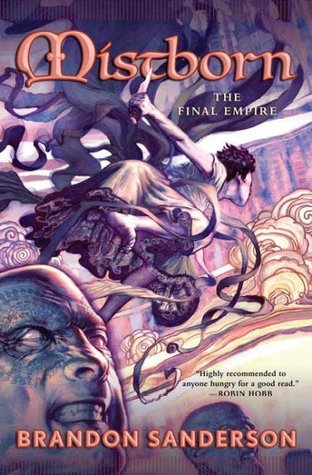 Mistborn: The Final Empire
Mistborn: The Final Empire Oathbringer
Oathbringer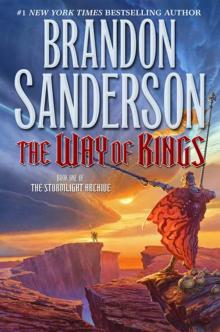 The Way of Kings
The Way of Kings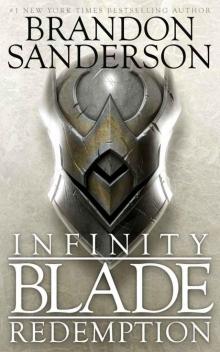 Redemption
Redemption Skin Deep
Skin Deep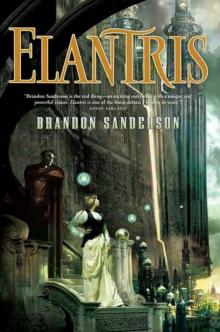 Elantris
Elantris Snapshot
Snapshot Sixth of the Dusk (Cosmere)
Sixth of the Dusk (Cosmere)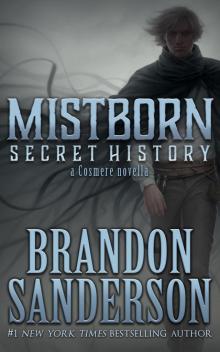 Mistborn: Secret History
Mistborn: Secret History White Sand, Volume 1
White Sand, Volume 1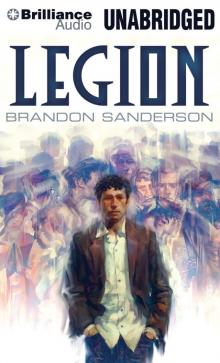 Legion
Legion The Well of Ascension
The Well of Ascension The Bands of Mourning
The Bands of Mourning Words of Radiance
Words of Radiance The Hero of Ages
The Hero of Ages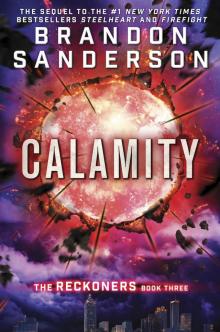 Calamity
Calamity Alcatraz Versus the Scrivener's Bones
Alcatraz Versus the Scrivener's Bones The Alloy of Law
The Alloy of Law The Emperors Soul
The Emperors Soul The Dark Talent
The Dark Talent The Gathering Storm
The Gathering Storm Alcatraz Versus the Shattered Lens
Alcatraz Versus the Shattered Lens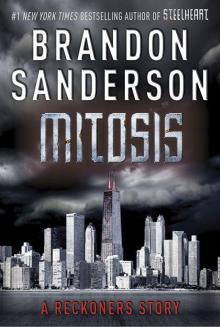 Mitosis
Mitosis Alcatraz vs. The Evil Librarians
Alcatraz vs. The Evil Librarians Rhythm of War (9781429952040)
Rhythm of War (9781429952040) Alcatraz Versus the Knights of Crystallia
Alcatraz Versus the Knights of Crystallia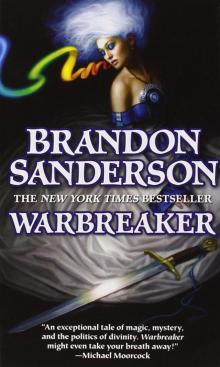 Warbreaker
Warbreaker Firstborn
Firstborn Starsight
Starsight Edgedancer
Edgedancer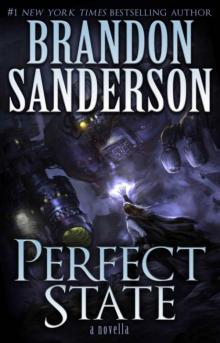 Perfect State
Perfect State Shadows of Self
Shadows of Self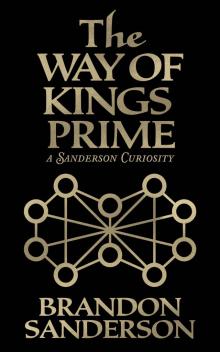 The Way of Kings Prime
The Way of Kings Prime Starsight (US)
Starsight (US) Shadows for Silence in the Forests of Hell
Shadows for Silence in the Forests of Hell Arcanum Unbounded: The Cosmere Collection
Arcanum Unbounded: The Cosmere Collection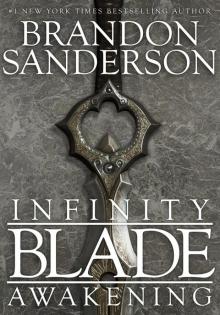 Awakening
Awakening Firefight
Firefight Dawnshard
Dawnshard Defending Elysium
Defending Elysium White Sand
White Sand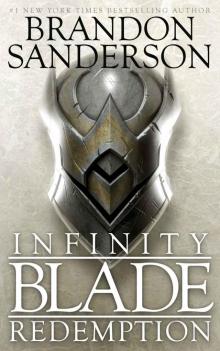 Infinity Blade: Redemption
Infinity Blade: Redemption The Final Empire
The Final Empire Skyward
Skyward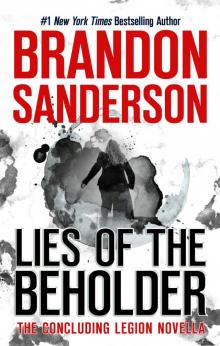 Lies of the Beholder
Lies of the Beholder Elantris e-1
Elantris e-1 Steelheart r-1
Steelheart r-1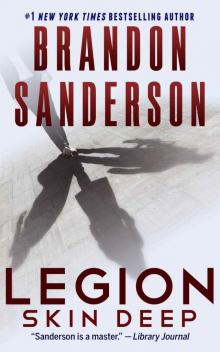 Legion: Skin Deep
Legion: Skin Deep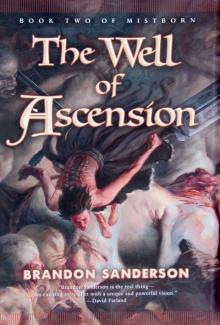 Well of Ascension
Well of Ascension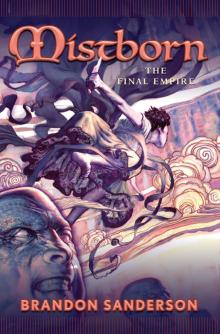 Mistborn
Mistborn Alcatraz versus the Evil Librarians
Alcatraz versus the Evil Librarians The Final Empire m-1
The Final Empire m-1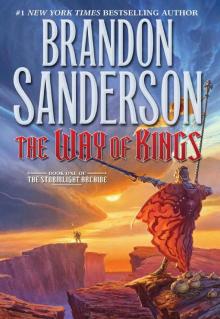 The Way of Kings (Stormlight Archive, The)
The Way of Kings (Stormlight Archive, The)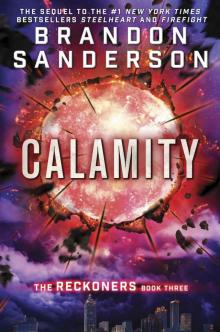 Calamity (The Reckoners)
Calamity (The Reckoners) Legion and the Emperor's Soul
Legion and the Emperor's Soul Legion: The Many Lives of Stephen Leeds
Legion: The Many Lives of Stephen Leeds The Mistborn Trilogy
The Mistborn Trilogy Bands of Mourning
Bands of Mourning Alcatraz
Alcatraz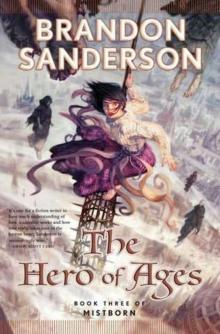 The Hero of Ages m-3
The Hero of Ages m-3 Alcatraz vs. the Shattered Lens
Alcatraz vs. the Shattered Lens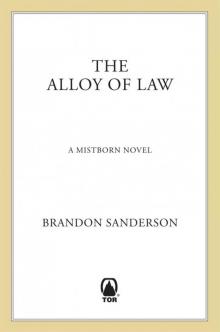 The Alloy of Law: A Mistborn Novel
The Alloy of Law: A Mistborn Novel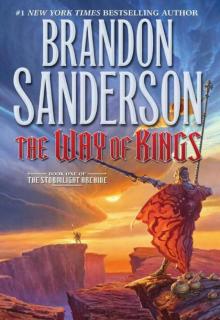 The Way of Kings sa-1
The Way of Kings sa-1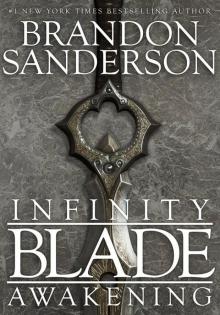 Infinity Blade: Awakening
Infinity Blade: Awakening Sixth of the Dusk
Sixth of the Dusk The Stormlight Archive
The Stormlight Archive The Aether of Night
The Aether of Night